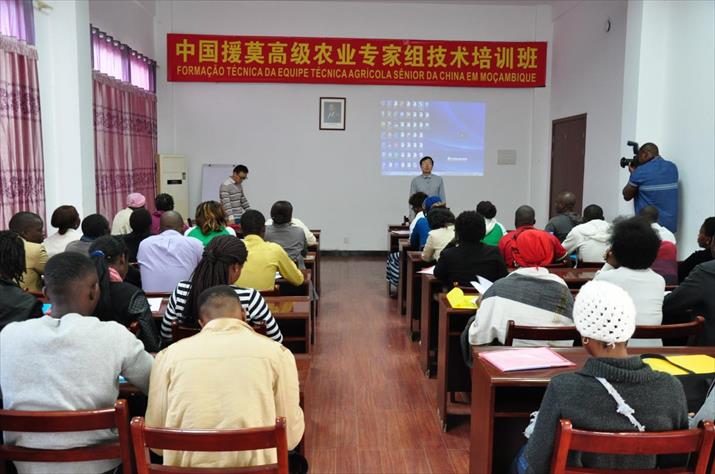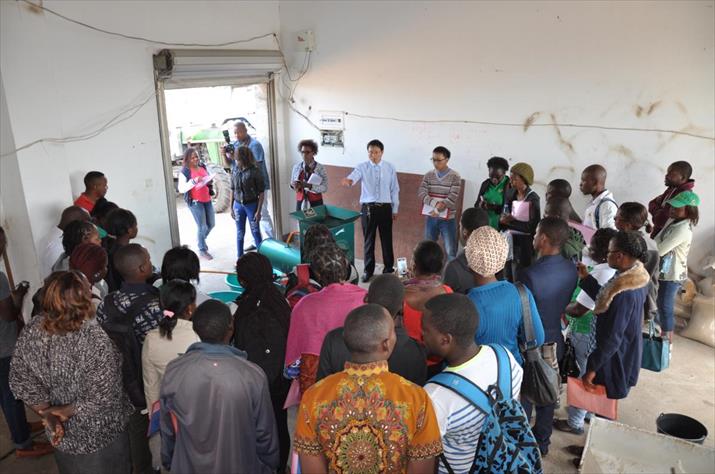|
||||||||||
| Home Nation World Business Opinion Lifestyle ChinAfrica Multimedia Columnists Documents Special Reports |
|
||||||||||
| Home Nation World Business Opinion Lifestyle ChinAfrica Multimedia Columnists Documents Special Reports |
| China |
| The Roots of Success |
| A Chinese agronomist inspires small farmers in Mozambique to better leverage their rich cassava resources |
| By Li Xiaoyu | VOL.9 October 2017 ·2017-09-28 |

Cassava - an edible starchy tuberous root found throughout Sub-Saharan Africa - is more than a staple food for Pedro Tomo.
As the owner of a small agro-food factory in Maputo Province in north Mozambique, Tomo has made cassava transformation the core of his current business model. His initiative began this August, when he embarked on a bold adventure: to transform local sweet potatoes and cassava into vermicelli.
The idea came from his wife, Otilia Tamele Tomo, a technician at Mozambique's Institute of Agricultural Research (IIAM), who works side by side with the Chinese agricultural experts based there. In July, she attended a training workshop on the production of vermicelli given by Chinese agronomist Zhang Honglin. At the end of the training, the 51-year-old expert gave her a bag of sweet potato vermicelli, which she brought home and cooked for her husband.
Convinced by the good taste, Tomo then contacted Zhang to learn more about the processing of cassava and sweet potatoes. "Our meeting gave me a lot of inspiring ideas," he said.
In fact, unlike Asia where cassava production is encouraged for industrial purposes and as an energy source, the plant remains mostly a staple food in Mozambique. The country consumes almost all of its own production. Industrial processing of cassava has yet to gain momentum, with only two South African-invested factories operating in the whole country, one producing cassava starch and the other cassava-based beer.
"There is great potential for industrial processing of cassava in Mozambique. But as I see it, farmers, especially small farmers, are not yet fully aware of its economic value. So I would like to share my experience in this field," Zhang told ChinAfrica.
A safe bet
As a member of the second Chinese agricultural mission to Mozambique, Zhang arrived in Maputo Province in November 2015 and was dispatched to China-Mozambique Agricultural Technology Demonstration Center, where he would be working for two years.
But even before his departure for Mozambique, he already had in his mind what he was going to do there: to help Mozambique leverage and industrialize its cassava production, which he described as a "highly value-added resource for the country."
Indeed, cassava is a plant that easily adapts to various conditions. It does not require a rich soil, is drought-resistant and often thrives where other plants die. This makes it a perfect fit for the natural environment of Mozambique, where the climate is rather dry and soil not very fertile.
According to the Food and Agriculture Organization of the United Nations, Mozambique ranks among the top 10 cassava-producing countries in the world with a cultivation area of 900,000 hectares, twice as much as China. The cassava industry - which includes cultivation and transformation into starch and ethanol - accounts for up to 3,000 byproducts covering nearly 30 different economic sectors, explained Zhang, adding that there is, therefore, an "enormous and very promising" market. Multinational firms worldwide specializing in this field generate a turnover of around $1 billion each year, noted Zhang.
To further illustrate cassava's great potential for the local economy, Zhang pointed to Guangxi Zhuang Autonomous Region in southwest China as an example of a success story. Accounting for 70 percent of the country's production, Guangxi is China's largest cassava producer. Ten years ago, local prices for untransformed cassava were around 250 yuan ($40) per ton. In 2007, China National Cereals, Oils and Foodstuffs Corp., a Chinese state-owned conglomerate, set up an ethanol production line with an annual processing capacity of 200,000 tons. As a result, cassava price has kept on rising, reaching 500 yuan ($80) per ton in 2015.

Focus on small farmers
In its 2017 report released on September 5, the Alliance for a Green Revolution in Africa, an organization dealing with agricultural products in Africa, highlighted the crucial role of small farmers, who create jobs and support sustainable economic growth.
With that in mind, Zhang has given dozens of training workshops to more than 200 small local farmers throughout his mission. During these workshops, he was able to demonstrate how to operate machines for the extraction of starch and production of vermicelli. But beyond these technical skills, Zhang wants to highlight the economic value of cassava processing by demonstrating its cost-effectiveness, in order to encourage small farmers to enter the field.
According to traditional practices of Mozambican farmers, once harvested, cassava is dried in the sun in order to be preserved. But despite this, the plant rots quickly. "If we transform cassava into starch using machines, its shelf life can be extended drastically. This method has nothing but advantages," said Anabela Zacarias, head of agro-food services at IIAM.
But for Zhang, the most rewarding aspect of his mission is to see small farmers like Petro Tomo adopt new skills and methods to improve their production. He said he would gladly support Tomo in his future projects, providing him with all the technical and material help he might need.
|
||||||||||||
| About Us | Contact Us | Advertise with Us | Subscribe |
| Copyright Beijing Review All rights reserved 京ICP备08005356号-5 京公网安备110102005860号 |